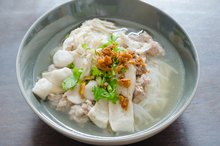What does fact checked mean?
At Healthfully, we strive to deliver objective content that is accurate and up-to-date. Our team periodically reviews articles in order to ensure content quality. The sources cited below consist of evidence from peer-reviewed journals, prominent medical organizations, academic associations, and government data.
The information contained on this site is for informational purposes only, and should not be used as a substitute for the advice of a professional health care provider. Please check with the appropriate physician regarding health questions and concerns. Although we strive to deliver accurate and up-to-date information, no guarantee to that effect is made.
What Is the Carb Count for Canned Tuna?
Canned tuna is a healthy but inexpensive food which can be used as a snack or a component of a well-balanced meal. According to Nutrition Data, canned tuna is low in saturated fat but rich in protein and B vitamins 1. Carbohydrates are a nutrient needed by the body in large amounts each day, yet some people limit their carbohydrate intake when they are trying to lose weight. Canned tuna is usually a food included in a low-carbohydrate diet.
Understanding Carbohydrates
Carbohydrates are nutrients in foods which provide energy for the body to do physical activity. Harvard University explains carbohydrates as sugar molecules with hydrogen and oxygen molecules linked together in a chain. Carbohydrates are found most abundantly in bread, cereals, pastas, rice, fruits and vegetables.
- Carbohydrates are nutrients in foods which provide energy for the body to do physical activity.
- Carbohydrates are found most abundantly in bread, cereals, pastas, rice, fruits and vegetables.
Types of Carbohydrates
What Can I Eat on a No Carb Diet?
Learn More
There are several different types of carbohydrates, with different molecules and different speeds at which the body uses them as energy. For instance, simple carbohydrates, such as fructose or glucose, are short chains of sugars which are used up as energy by the body very quickly, while complex carbohydrates are long chains of sugars which take a long time to digest and absorb.
Canned Tuna Nutrition
Canned tuna, while full of protein and healthy amino acids, does not have any carbohydrates . There are no carbohydrates in canned tuna because tuna is a type of meat and carbohydrates only come from plant products like vegetables and grains. Canned tuna is made up of approximately 94 percent protein and 6 percent fat, according to Nutrition Data.
Canning Process
What Food Group Has the Least Amount of Carbohydrates?
Learn More
Many people know that tuna does not contain any carbohydrates, but some people wonder if any carbohydrates are added during the canning process. During the processes of canning tuna, the fish is simply cooked to soften the meat and then placed in a liquid brine such as water or oil. Since neither water nor oil contain carbohydrates, no carbohydrates are added to tuna during the canning process.
Flavored Varieties
Special flavored varieties of canned tuna, such as sun-dried tomato flavor and garlic-herb flavor, have become more popular in recent days because they are inexpensive like regular tuna, but more flavorful and a change from the mundane flavor of plain tuna. Flavored tuna usually has added carbohydrates from various sauces, herbs and vegetables used. Make sure to compare the nutritional facts with plain tuna before buying a new flavor variety.
Related Articles
References
- Fish, tuna, light, canned in water, drained solids. Nutrition Data.
- Fish, tuna, light, canned in water, without salt, drained solids. FoodData Central. U.S. Department of Agriculture. Published April 1, 2019.
- Dhurmeea Z, Pethybridge H, Appadoo C, Bodin N. Lipid and fatty acid dynamics in mature female albacore tuna (Thunnus alalunga) in the western Indian Ocean. PLOS ONE. 2018. doi:10.1371/journal.pone.0194558
- Vitamin B12 or folate deficiency anaemia. National Health Service. Updated 2019.
- Sparkes C, Gibson R, Sinclair A, Else PL, Meyer BJ. Effect of low dose docosahexaenoic acid-rich fish oil on plasma lipids and lipoproteins in pre-menopausal women: A dose⁻response randomized placebo-controlled trial. Nutrients. 2018;10(10). 10.3390/nu10101460
- Simonetto M, Infante M, Sacco RL, Rundek T, Della-Morte D. A novel anti-inflammatory role of omega-3 PUFAs in prevention and treatment of atherosclerosis and vascular cognitive impairment and dementia. Nutrients. 2019;11(10). doi:10.3390/nu11102279
- Damanti S, Azzolino D, Roncaglione C, Arosio B, Rossi P, Cesari M. Efficacy of nutritional interventions as stand-alone or synergistic treatments with exercise for the management of sarcopenia. Nutrients. 2019;11(9). doi:10.3390/nu11091991
- Diabetes superfoods. American Diabetes Association. Updated 2020.
- Histamine toxicity. American Academy of Allergy, Asthma & Immunology. Updated 2020.
- ACOG practice advisory: Update on seafood consumption during pregnancy. American College of Obstetricians and Gynecologists. Updated 2017.
- Canned tuna. Seafood Health Facts: Making Smart Choices Balancing the Benefits and Risks of Seafood Consumption. Updated 2020.
- Selecting and serving fresh and frozen seafood safely. U.S. Food and Drug Administration. Updated 2019.
Writer Bio
Sarah Davis has worked in nutrition in the clinical setting and currently works as a licensed Realtor in California. Davis began writing about nutrition in 2006 and had two chapters published in "The Grocery Store Diet" book in 2009. She enjoys writing about nutrition and real estate and managing her website, RealtorSD.com. She earned her bachelor's degree in nutrition from San Diego State University.









